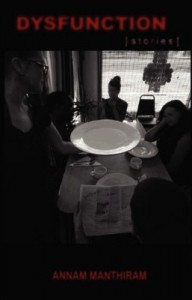Dysfunction
 Dysfunction
Dysfunction
by Annam Manthiram
Aqueous Press, December 2012
170 pages / $14 Buy from Amazon or Aqueous Press
The dysfunctional nature of many of the characters that populate Annam Manthiram’s Dysfunction only serve to highlight their strange humanity. Throughout, “Variations on a Blossoming Marriage,” we are treated to an alphabetical catalog of failed relationships. The description for Calla Lily is poignantly emblematic of a plight the characters share: “He liked white— white everything. White sheets, white toothpaste, even white curry. I didn’t know how to make white curry. Everything I touched turned brown.” The clash of tactile expectation versus the moment of actual contact is the intersection that the stories hinge on and that fulcrum becomes more pronounced with the cultural context denoted by brown.
In “Asha Ma,” we are taken through the life of a young Indian woman. From the moment she is born, there is an invisible gauge against which her life is measured. When she fails to match the barometer her mother hoped for during a ritual performed for her first birthday, she is deemed “inauspicious” and “a sacrilege.” The irony is that, of course, a simple baby game intended for playful festivities takes on religious connotations that would haunt her life. In high school, she is often mistaken for another Indian student named Cynthia. When Cynthia takes time off from school due to chicken pox, Asha masquerades as Cynthia, and in a sad commentary on racial stereotypes, the other students can’t tell the difference. No expected fallout happens upon Cynthia’s return, who simply refers Asha to the principal and he in turn to a therapist. Neither of them can help her find what she wasn’t able to track down for her birthday ritual; her identity, mainly because the given categories didn’t fit. A disconnected relationship happens with her co-worker, Joe, whom she both attracts and repels. It ends when she makes out with a stranger at a party Joe invited her to (more specifically, the stranger licks her clavicle). Again, there is no blowout, no jealous outrage by Joe. Instead, he falls for another woman at the office and moves on. The story reaches its denouement with a sordid revelation of a past affair from her parents that causes Asha to come to terms with her absent self. The ending consists of self-discovery in defying self-discovery. Pat epiphanies about ‘place in the world’ are replaced by acceptance of the void of simple being and the climax defuses itself similar to the other encounters in the story.
June 3rd, 2013 / 11:00 am
